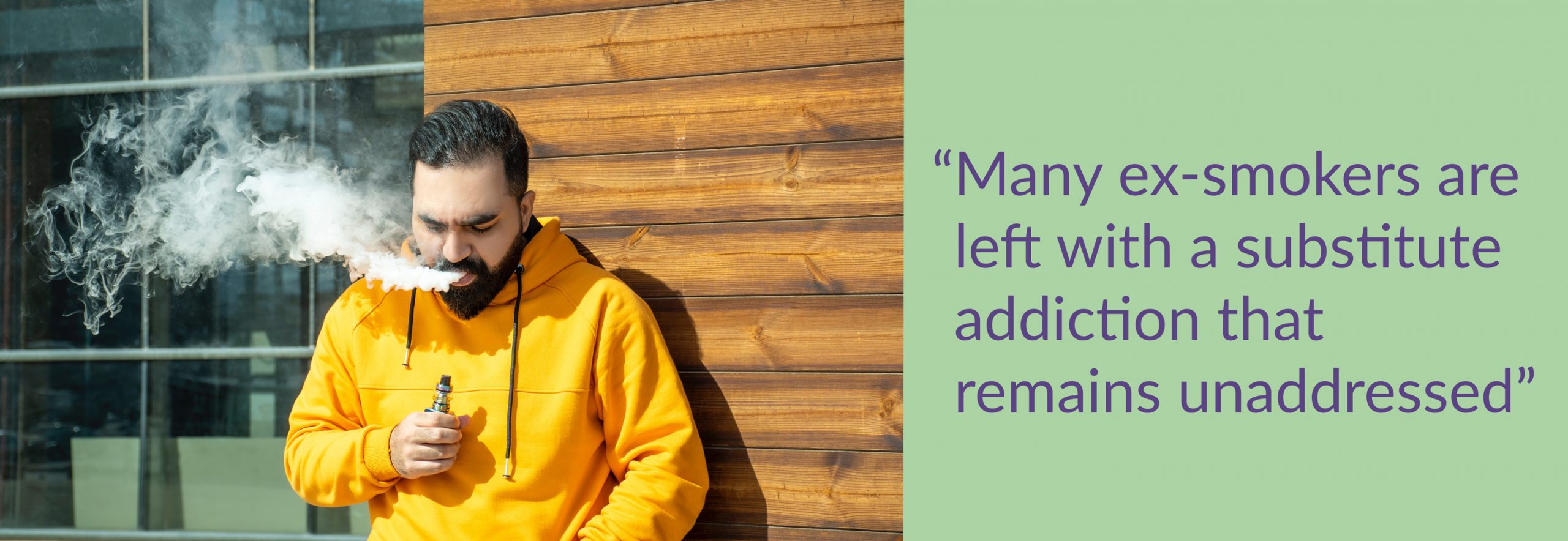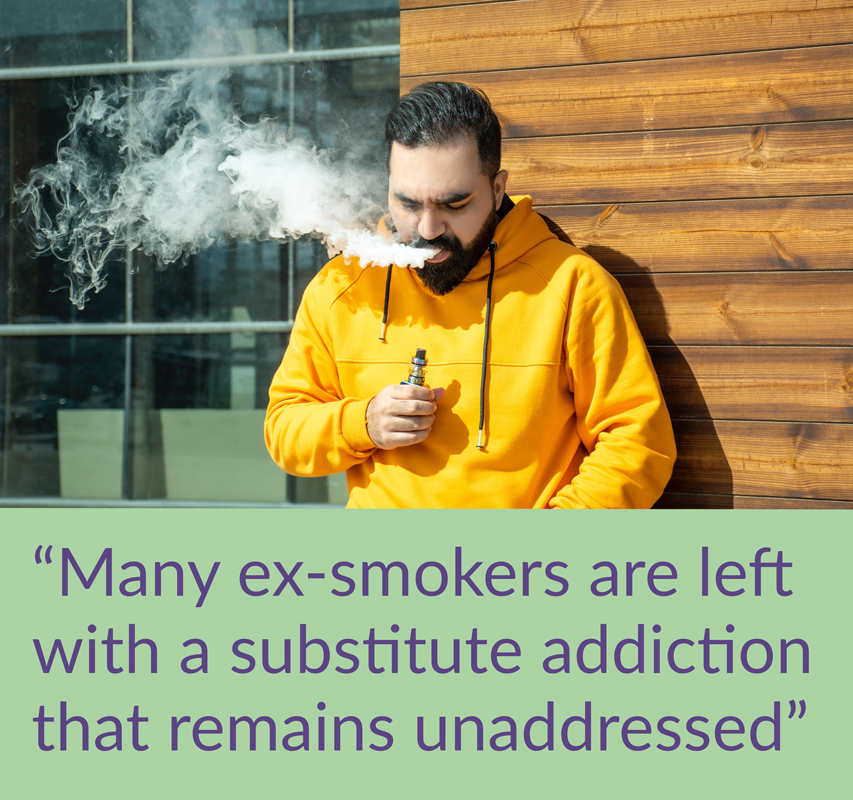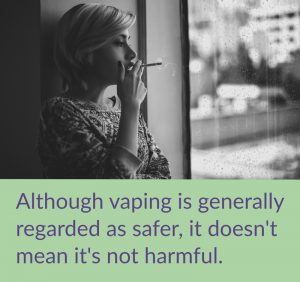

How to quit vaping
A large percentage of smokers in the UK have managed to successfully make the switch to vaping as an alternative that is recommended by the NHS as being ‘95% safer than smoking’ which has made a dramatically positive effect in the total percentage of UK smokers, but these ex-smokers are now left still feeding a substitute nicotine addiction that remains unaddressed.
Having successfully used vaping to stop smoking, many people are now deciding they want to stop vaping as well but are faced with the same seemingly impossible challenge as they were when they decided that they wanted to stop smoking.
Is vaping legal in the UK?
If you have been introduced to vaping and want to know the in’s and out’s of Vaping laws in the UK, you can read our independent article on the subject.
Does vaping cause cancer?
The short answer to this is that we don’t know 100%, but it is very unlikely.
So far there have been no direct links to vaping as a cause of cancer and the main reason why medical professionals doubt that it will is because there is nothing being burnt when vaping correctly, but as vaping is still quite a new phenomenon, there is not the long-term (10-20 year) scientific evidence to prove any direct health concerns related to vaping. At this point, the NHS state with confidence that vaping is 95% safer than smoking and as smokers are the main demographic that take up vaping, they recommend it as a safer alternative.
It’s widely known that when inhaling something which has been burnt, like tobacco, it releases carcinogenic (cancer causing) chemicals. Vaping however is based on the premise that you are not burning anything but vapourising a liquid solution (e-liquid) which often contains nicotine. There is however the possibility that if an e-cigarette is not used correctly, for example if the heating elements are not replaced at the end of their life span, or the vape pen is used when there is no more e-liquid in the chamber, there is a likelihood that you could end up inhaling combusted materials that could release harmful/carcinogenic chemicals.
If you have any concerns about the long-term effects of vaping on your health, you should look to stop as soon as possible and always speak to your GP for medical advice.
Are you diabetic and have concerns about vaping?
If you have diabetes and want to find out more information about whether vaping is safe, please read our article: Facts about Vaping and Diabetes>>

Why should I quit vaping?
Whether you are suffering with negative short-term side effects of vaping such as a headache from vaping or a vaping sore throat, you have concerns about long-term vaping health risks such as the effects of vaping on the lungs, or you have concerns about whether vaping is bad for your teeth, there are plenty of valid physical reasons that you might want to quit vaping that you shouldn’t ignore.
You may also have just realised that when you started vaping you wanted to stop smoking completely and now find yourself stuck with another addictive habit you need to shake off.
Either way, most people vape e-liquids with nicotine and having any addiction can have a negative effect on other areas of your life such as your relationships. If your attention is constantly being drawn to an addiction that you feed on a regular basis and you rely on the dopamine release from nicotine to feel content in your life, this is going to have an impact on the relationships that you have with those closest to you, including yourself. Living a life free from addiction is always advisable, so how about making that commitment to quit today?
Are you pregnant and vaping?
If you are pregnant and are looking for specific information regarding you and your baby’s health, please read our article: Vaping while pregnant – is it safe?

When should I quit vaping?
Once you have made the decision that you want to stop vaping you should act fast to have the best chance of being successful.
As with quitting smoking, evidence shows that those who set a ‘quit date’ within the next two weeks are most likely to stick to the commitment. It’s far too easy to keep putting it off if you do not start to act now.
Short answer = now!
How to stop vaping
We can follow much of the same advice that is recommended for stopping smoking when it comes to quitting vaping – although it is not as harmful as smoking, vaping nicotine is addictive in the same way.
Although everyone is different and will want or need to approach the challenge of quitting in a different way, we have 5 great pieces of advice that apply to everyone and address the main factors involved in stopping vaping altogether.
Our top 5 tips on quitting vaping...
1. Set a date within the next two weeks and stick to it!
2. Don’t keep it a secret! tell your friends and family and ask for their support
3. Dispose of all devices, e-liquids and paraphernalia – remove the temptation to pick them up again.
4. Explore healthy new hobbies & rewarding activities that give you a new focus and occupy your mind and hands.
5. Celebrate your success! It’s important to reward yourself and recognise the achievements you make.
Why is so hard to quit?
There are two main aspects to vaping that make it hard to quit. Nicotine and the ‘physical habit‘.
Nicotine is an addictive substance and can be challenging to stop. Nicotine interacts with dopamine receptors in our brains that releases the ‘feel good’ chemical. Lots of things in everyday life can give us this natural ‘high’, but anyone that is addicted to nicotine becomes dependent on this regular release of dopamine and if they don’t get it, they can become irritable, grouchy and unhappy. You will probably feel this quite intensely when you quit nicotine (nicotine withdrawal) but you have to have faith in the fact that this is only temporary and generally passes within a week or so whilst your brain’s natural reward system restores it’s balance. It’s highly likely that if you are vaping, then you have been addicted to nicotine for a long time and you must allow your body and brain some time to readjust and be prepared to feel cranky whilst this happens.
In regards to nicotine withdrawal, it’s important to be gentle and kind to yourself, physically and mentally. Don’t be too harsh and unforgiving – some mindfulness exercises like meditation or Yoga are strongly advised.
Be kind to yourself...
We have collaborated with Helen, a yoga teacher of 9 years, to introduce some simple breathing techniques and exercises that can help you quit vaping and deal with the cravings from nicotine withdrawal.

How Yoga can help you quit
Yoga is great for so many aspects of physical and mental wellbeing and can definitely help you feel better about yourself and your journey towards a smoke-free life. I’d be delighted if I can encourage you to dip your toes in.
Ready to quit?
We are currently offering a free 1-2-1 guided program to help you quit nicotine for good. By taking part you will help us shape this service for other smokers and vapours who want to give up.
Other articles you may be interested in...

Vaping while pregnant – is it safe?
Whilst vaping is understood to be a less harmful alternative to smoking and is sometimes recommended to expectant mothers, nicotine can cause permanent damage to a baby’s developing organs during this critical period of growth.

Is nicotine bad for you?
If you have concerns about whether nicotine is bad for you, we hope that with our many years of experience in the smoking cessation industry, we can help you to make up your own mind on the subject by providing the answers you need in a balanced and non-biased way.

How to Quit Vaping
A large percentage of smokers in the UK have managed to successfully make the switch to vaping as an alternative that is recommended by the NHS as being ‘95% safer than smoking’, but these ex-smokers are now left still feeding a substitute nicotine addiction that remains unaddressed.
